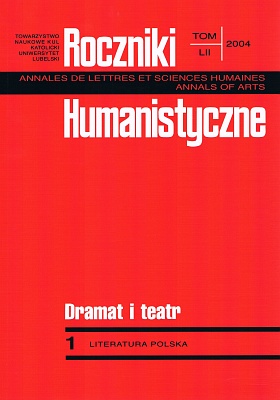Maciej Szukiewicz i jego wizja teatru
Abstrakt
Maciej Szukiewicz (1870-1943), one of the forerunners of modernism in Cracow, a man of considerable literary talent, interested and successfully working in different areas, was not able to secure his place in the history of Polish culture of the turn of the 19th century. He studied chemistry and history of art, and he worked as a museologist (for many years he was the custodian of the National Museum and of the Matejko's Home), but he also was a pedagogue, a critic, a translator, an editor, a researcher and a writer. At the same time he was close to the theatre whose glow formed his personality from his earliest years.
Szukiewicz learned about the world of the theatre on various planes: as a dramatist and translator (especially of Czech plays), as an advisor to theatre directors and managers in the field of the repertoire, a critic and author of articles, the designer of the Stanisław Wyspiański Theatrical Museum, the inventor of para-theatrical spectacles. Analysis of his numerous statements shows that he had precise views of the questions connected with organization of the theatre, the repertoire policy, the tasks of the actors or duties of the stage managers. Close contacts with many actors, following the achievements of contemporary European dramaturgy, keen observation of the way theatres in Poland and abroad functioned – are some of Szukiewicz's experiences that gradually formed his own vision of the theatre.
Copyright (c) 2004 Roczniki Humanistyczne

Utwór dostępny jest na licencji Creative Commons Uznanie autorstwa – Użycie niekomercyjne – Bez utworów zależnych 4.0 Międzynarodowe.





